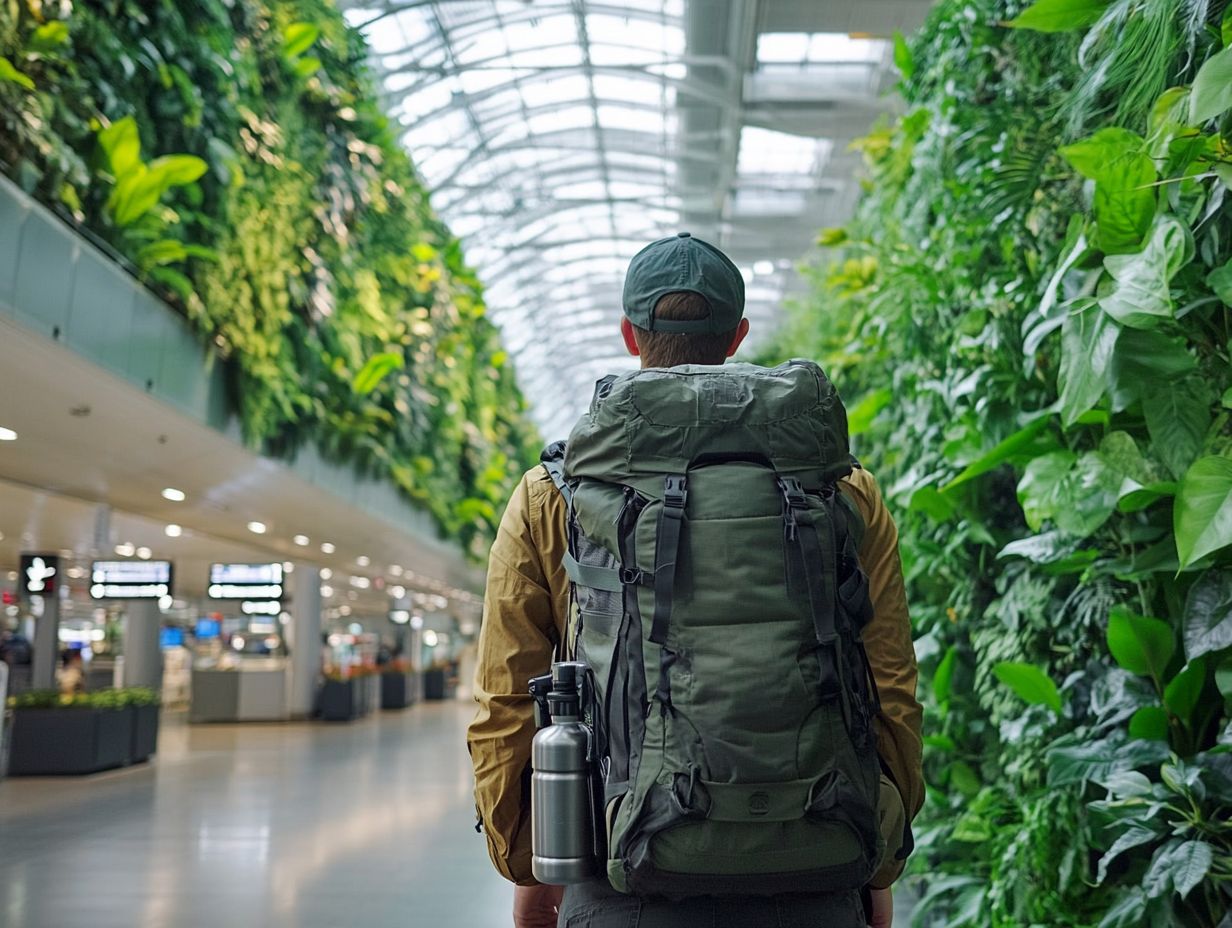Navigating Airports Sustainably: Top Tips
Traveling may seem like a personal escape, but it s essential to recognize its environmental impact.
You ll discover the significance of sustainable travel as you delve into how air travel influences our planet. Learn about the innovative practices airports are implementing to reduce their carbon footprint.
You can also find practical tips for packing sustainably and making eco-friendly choices during your airport experience. Carry those green practices into your destination!
Contents
Key Takeaways:

- Pack smart and plan ahead to reduce waste and conserve resources during your airport experience.
- Understand the environmental impact of air travel and choose airports that have implemented sustainable practices.
- Extend your sustainable practices beyond the airport by continuing them at your destination. Small efforts can make a big difference.
The Importance of Sustainable Travel
Sustainable travel is becoming essential as you navigate the challenges of climate change. It highlights the importance of adopting responsible tourism practices that minimize carbon emissions while also promoting economic growth and caring for our natural resources.
As you strive to find harmony between caring for the environment and enjoying air travel, being mindful of your travel choices is crucial for reducing your carbon footprint. By making informed decisions about transportation, accommodations, and activities, you can play a significant role in fostering a sustainable future that benefits both you and the destinations you explore. For more tips, check out this beginner’s guide to traveling sustainably.
Understanding the Impact of Air Travel
Air travel significantly contributes to your carbon footprint by releasing greenhouse gases, which are gases that trap heat in the atmosphere and worsen climate change.
The aviation industry accounts for nearly 2-3% of global carbon dioxide emissions. For instance, a single round-trip flight from New York to London can generate about 1.5 tons of CO2 per passenger. Aircraft are energy-intensive and primarily rely on jet fuel. As your demand for air travel rises, the urgency to tackle these environmental repercussions increases.
While innovations in sustainable aviation fuels and carbon offset programs are being explored, they are still in early stages compared to the vast emissions currently produced. This underscores the need for a broader commitment to sustainability within the industry.
Sustainable Airport Practices

Sustainable airport practices have become essential in contemporary aviation, emphasizing energy efficiency, waste reduction, and the integration of renewable energy systems. These approaches foster environmentally responsible airport operations that comply with federal regulations and meet community expectations.
By developing comprehensive utility master plans and engaging with stakeholders, airports are poised to implement innovative solutions that elevate their sustainability efforts and achieve long-term environmental objectives.
Such practices not only enhance airport infrastructure but also strengthen community trust and promote tourism, creating a ripple effect of positive impact.
Efforts by Airports to Reduce Environmental Impact
Airports worldwide are adopting various green initiatives. These efforts aim to reduce their environmental footprint and enhance sustainability.
Many airports are also implementing noise management strategies. For instance, San Francisco International Airport has established procedures for pilots to follow optimal flight paths.
Recycling initiatives are taking off. Chicago O’Hare International Airport has set a bold zero-waste goal, focusing on recycling and composting.
The use of eco-friendly products is becoming standard in operations. This includes biodegradable utensils and green cleaning supplies.
These efforts promote a cleaner environment and support future airport operations globally.
Preparing for Sustainable Airport Travel
Preparing for sustainable airport travel means careful planning and a commitment to eco-friendly practices. These practices lessen your environmental footprint and enhance your overall travel experience.
Opt for sustainable modes of transportation. Pack thoughtfully with reusable items and energy-efficient products. Each choice reflects a deeper dedication to sustainability in air travel.
By understanding these practices, you can play a crucial role in advancing airport sustainability initiatives and following the top sustainable travel practices to follow.
Packing and Planning for a Sustainable Trip

Packing for a sustainable trip means prioritizing reusable alternatives. Focus on energy-saving measures to minimize your environmental impact.
Choose cloth bags for snacks and stainless steel water bottles. These choices help reduce waste significantly.
Think minimalism; pack only what s necessary. This approach lightens your load and promotes thoughtful consumption.
Use multi-purpose travel gear, like a backpack that doubles as a daypack. Also, consider solar chargers to keep devices powered sustainably.
With these strategies, you enhance your travel experience and contribute to a healthier planet.
During Your Airport Experience
As you navigate the airport, use sustainable practices like waste reduction. Your actions can significantly enhance environmental stewardship.
Your positive contribution will also improve your overall passenger experience.
How to Reduce Waste and Conserve Resources
Reducing waste and conserving resources during your airport visit is easy with conscious choices. For example, say no to single-use plastics like straws and bottles.
Instead, carry a reusable bottle to fill at hydration stations. Opt for digital boarding passes to cut down on paper waste.
When choosing food, support restaurants that use local, organic ingredients. This promotes sustainability and healthier eating.
By making these mindful choices, you contribute to a sustainable future.
After Your Airport Trip

After your journey, maintain sustainable practices at your destination. This commitment fosters environmental stewardship and strengthens community trust.
Continuing Sustainable Practices at Your Destination
Continuing sustainable practices at your destination is crucial for reducing your harm to the environment and nurturing community support.
By making conscious choices, you can actively contribute to the well-being of the places you visit. Supporting local businesses gives the economy a boost and keeps funds within the community, helping to preserve its unique cultural fabric.
Engaging in responsible tourism like choosing eco-friendly accommodations (which are good for the environment) or joining guided tours led by locals enables you to leave a lighter footprint while immersing yourself in authentic experiences. To enhance your travel choices, consider these tips for eco-friendly decisions.
Join the movement by participating in environmental initiatives, like beach cleanups or wildlife conservation efforts. These activities foster meaningful connections with the local ecosystem and emphasize the importance of preserving it for future generations.
Frequently Asked Questions
- Bring a reusable water bottle to refill at water fountains instead of buying plastic bottles. This reduces waste and saves money.
- Opt for electronic boarding passes instead of printing them out. This minimizes paper usage and saves resources.
- Pack light and only bring essential items. This not only makes your travels more convenient but also reduces carbon emissions from heavy luggage.
- Choose public transportation or shared rides instead of renting a car or taking a taxi. This reduces carbon emissions and supports sustainable transportation options.
- Look for airport restaurants and shops that offer sustainable options, such as locally-sourced food or eco-friendly products, to support environmental stewardship.
- Consider offsetting your carbon footprint by purchasing carbon credits or supporting sustainable initiatives that mitigate the environmental impact of your flight as part of broader climate action.
Act now to make a difference! Start your journey towards sustainability today!






